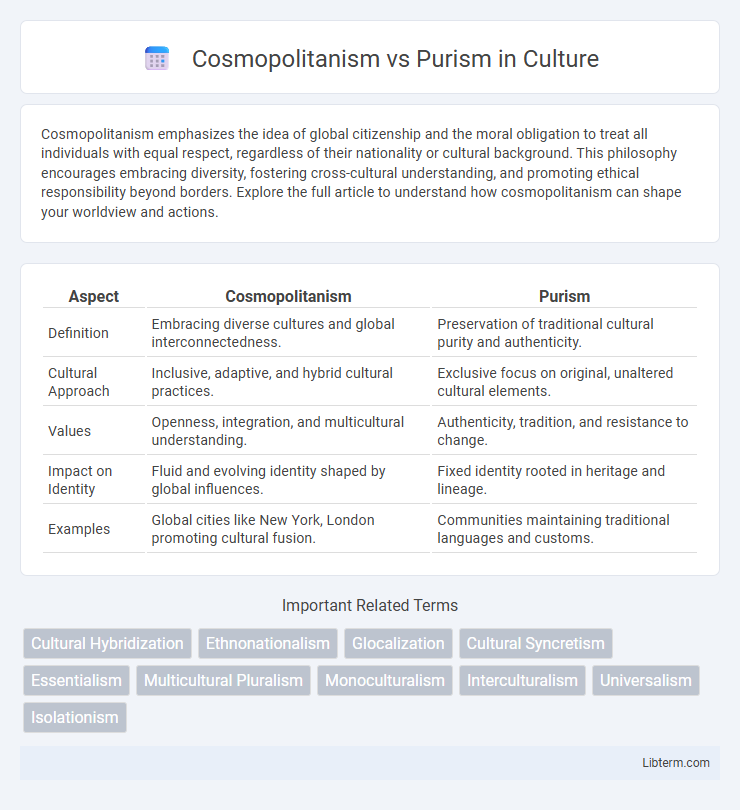Cosmopolitanism emphasizes the idea of global citizenship and the moral obligation to treat all individuals with equal respect, regardless of their nationality or cultural background. This philosophy encourages embracing diversity, fostering cross-cultural understanding, and promoting ethical responsibility beyond borders. Explore the full article to understand how cosmopolitanism can shape your worldview and actions.
Table of Comparison
| Aspect | Cosmopolitanism | Purism |
|---|---|---|
| Definition | Embracing diverse cultures and global interconnectedness. | Preservation of traditional cultural purity and authenticity. |
| Cultural Approach | Inclusive, adaptive, and hybrid cultural practices. | Exclusive focus on original, unaltered cultural elements. |
| Values | Openness, integration, and multicultural understanding. | Authenticity, tradition, and resistance to change. |
| Impact on Identity | Fluid and evolving identity shaped by global influences. | Fixed identity rooted in heritage and lineage. |
| Examples | Global cities like New York, London promoting cultural fusion. | Communities maintaining traditional languages and customs. |
Defining Cosmopolitanism and Purism
Cosmopolitanism advocates for embracing cultural diversity and global interconnectedness, emphasizing inclusive world citizenship and the blending of traditions. Purism insists on maintaining cultural or linguistic purity, prioritizing preservation of traditional norms and resisting external influences. These contrasting ideals shape debates over identity, cultural exchange, and globalization in contemporary society.
Historical Origins of Both Concepts
Cosmopolitanism traces its historical origins to ancient Greek philosophy, particularly the teachings of Diogenes and the Stoics, who advocated for a universal human community transcending local identities. Purism emerged later, rooted in nationalist movements of the 19th and 20th centuries, emphasizing cultural and linguistic purity to preserve distinct ethnic identities against perceived external influences. These contrasting historical backgrounds underline cosmopolitanism's emphasis on global inclusivity and purism's focus on cultural preservation.
Key Philosophical Differences
Cosmopolitanism embraces universal moral values and global citizenship, emphasizing interconnectedness and cultural diversity, while Purism advocates for strict adherence to original or traditional standards, often resisting external influences to preserve perceived purity. The key philosophical difference lies in Cosmopolitanism's open, inclusive ethics versus Purism's exclusive, preservationist stance. This fundamental divide affects perspectives on identity, ethics, and cultural integration within global and local contexts.
Cultural Implications and Influences
Cosmopolitanism promotes cultural exchange and diversity, fostering global understanding by integrating multiple cultural perspectives and encouraging cross-cultural dialogue. Purism emphasizes preserving cultural heritage and traditions, resisting external influences to maintain a community's distinct identity and authenticity. These contrasting approaches shape societal attitudes toward globalization, influencing policies on immigration, education, and cultural preservation.
Cosmopolitanism in a Globalized World
Cosmopolitanism in a globalized world promotes cultural exchange and interconnectedness, encouraging individuals to embrace diversity and global citizenship. It values pluralism and advocates for inclusive dialogue across national, ethnic, and religious boundaries, fostering tolerance and mutual understanding. By prioritizing shared human values over rigid cultural identities, cosmopolitanism supports cooperation on global challenges such as climate change, migration, and human rights.
Purism’s Role in Cultural Identity
Purism plays a critical role in preserving cultural identity by emphasizing the protection and maintenance of traditional languages, customs, and values against external influences. It fosters a sense of belonging and continuity within communities, ensuring that unique cultural heritages are passed down accurately through generations. This approach often prioritizes cultural authenticity and resilience, reinforcing distinct social norms and practices amid globalization.
Major Debates and Controversies
Major debates in cosmopolitanism versus purism center on the balance between global cultural integration and the preservation of distinct cultural identities. Cosmopolitanism advocates for embracing diversity and cross-cultural exchange to foster global solidarity, while purism emphasizes maintaining cultural purity to protect traditions and social cohesion. Controversies arise over issues such as immigration, language preservation, and globalization's impact on indigenous cultures, highlighting tensions between openness and cultural preservation.
Notable Thinkers and Their Perspectives
Notable thinkers in cosmopolitanism include Kwame Anthony Appiah, who advocates for a global ethics that respects cultural diversity while emphasizing shared human values. Purist perspectives are often represented by philosophers like Michael Walzer, who stresses the importance of cultural particularism and the preservation of distinct community boundaries. The debate revolves around balancing universal moral principles with respect for local traditions and communal identities.
Contemporary Case Studies
Contemporary case studies in cosmopolitanism versus purism reveal tensions between global integration and cultural preservation, exemplified by the migration policies and multicultural frameworks in countries like Canada and France. Canada's embrace of multiculturalism demonstrates cosmopolitan values promoting diversity and inclusion, while France's emphasis on laicite reflects purist efforts to maintain national identity and secularism. These contrasting approaches highlight the complex balance between fostering global citizenship and protecting cultural heritage in the modern geopolitical landscape.
Future Trends and Challenges
Future trends in cosmopolitanism emphasize global interconnectedness, cultural hybridity, and the dynamic exchange of ideas across borders, challenging purism's emphasis on cultural or ideological purity. Purism faces challenges maintaining distinct identities amid increasing globalization, cultural blending, and digital communication technologies that promote diversity and hybrid identities. The ongoing tension includes navigating political polarization, technological disruptions, and socio-economic inequalities that influence how societies balance inclusivity with preserving cultural heritage.
Cosmopolitanism Infographic

 libterm.com
libterm.com